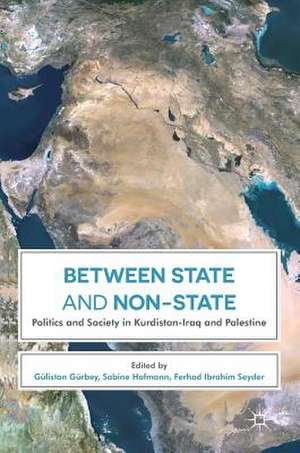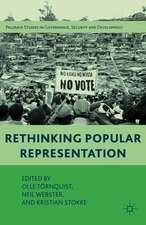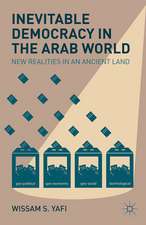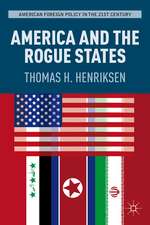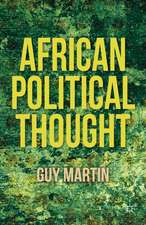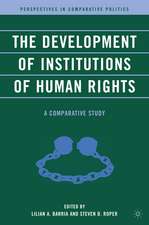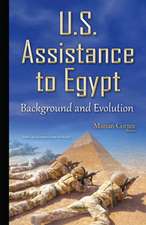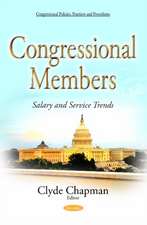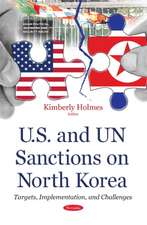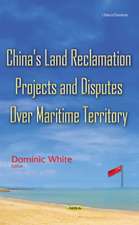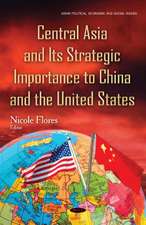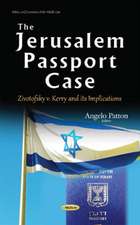Between State and Non-State: Politics and Society in Kurdistan-Iraq and Palestine
Editat de Gülistan Gürbey, Sabine Hofmann, Ferhad Ibrahim Seyderen Limba Engleză Hardback – 23 mar 2017
| Toate formatele și edițiile | Preț | Express |
|---|---|---|
| Paperback (1) | 581.47 lei 6-8 săpt. | |
| Palgrave Macmillan US – 9 dec 2018 | 581.47 lei 6-8 săpt. | |
| Hardback (1) | 783.98 lei 6-8 săpt. | |
| Palgrave Macmillan US – 23 mar 2017 | 783.98 lei 6-8 săpt. |
Preț: 783.98 lei
Preț vechi: 956.08 lei
-18% Nou
Puncte Express: 1176
Preț estimativ în valută:
150.02€ • 160.42$ • 125.08£
150.02€ • 160.42$ • 125.08£
Carte tipărită la comandă
Livrare economică 18 aprilie-02 mai
Preluare comenzi: 021 569.72.76
Specificații
ISBN-13: 9781349950652
ISBN-10: 1349950653
Pagini: 272
Ilustrații: XI, 278 p. 2 illus.
Dimensiuni: 148 x 210 x 18 mm
Greutate: 0.5 kg
Ediția:1st ed. 2017
Editura: Palgrave Macmillan US
Colecția Palgrave Macmillan
Locul publicării:New York, United States
ISBN-10: 1349950653
Pagini: 272
Ilustrații: XI, 278 p. 2 illus.
Dimensiuni: 148 x 210 x 18 mm
Greutate: 0.5 kg
Ediția:1st ed. 2017
Editura: Palgrave Macmillan US
Colecția Palgrave Macmillan
Locul publicării:New York, United States
Cuprins
Introduction: Conceptualizing De Facto Statehood of Kurdistan-Iraq and Palestine .- The Iraqi Kurds: Historical backgrounds of a non-state nation .- Historical Background of the State-Building Process in Palestine .- The Evolution of the Political System of the Kurdistan Region of Iraq .- The (Quasi) Political System of Palestine .- The Economic System(s) of the Kurdistan Regional Government, Iraq .- What is the “Palestinian Economy”? .- The Reality of Civil Society in Kurdistan Region .- Civil Society in Palestine .- The United States and the Kurds of Iraq: Strange Allies .- Palestinian Diplomacy: Past and Present .- Understanding Kurdistan-Iraq and Palestine: Comparative Features, Similarities and Differences .- Reflections of Statehood in the Middle East.
Notă biografică
Gülistan Gürbey is Adjunct Professor of Political Science, Freie Universität Berlin, Germany.
Sabine Hofmann is Researcher and Lecturer at the Center for North Africa and Middle Eastern Politics, Freie Universität Berlin, Germany, and the Center for Near and Middle Eastern Studies, University of Marburg, Germany.
Ferhad Ibrahim Seyder is Professor of Political Science at the Center for Kurdish Studies, University of Erfurt, Germany.
Textul de pe ultima copertă
This edited volume compares the internal dimension, politics and society in Kurdistan-Iraq and Palestine. In particular, it focuses on internal processes in Kurdistan-Iraq and Palestine (Palestinian Territory of the West Bank and Gaza Strip) in their specific shaping, development and transformation. The contributing authors analyze the transformation processes of the internal power structures, the economic basics, and the civil societies and provide an overview of the current political, economic and societal situation and challenges in both regions. The book presents the similarities and differences between both de facto states with regard to a set of guidelines: legitimacy, power relations, transformation of politics and society. It provides empirical explanations and contributes to a better understanding of both de facto states.
Caracteristici
First quantitative and comparative analysis of Kurdistan-Iraq and Palestine as de-facto states Provides an overview over the current political, economic and societal situations and the challenges both de-facto states face Unique contributions from authors of the regions and internationally
